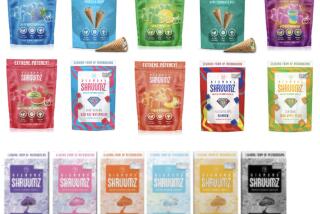Laundry detergent capsules mistaken for candy by kids
- Share via
When single-dose laundry detergents entered the market earlier this year, they were hailed for their efficiency. Not only do they use less water and less packaging than traditional detergents but they also are more convenient for consumers, who can drop a soap capsule into the washer -- no measuring or pouring needed.
But products such as Tide Pods, All Mighty Pacs and Purex UltraPacks now are being blamed for hundreds of calls to poison-control centers, which report that children are mistaking the small, brightly colored capsules for candy.
In California alone, 307 accidental ingestions of single-dose laundry detergents were reported between March 7 and Sept. 5. That number included 13 admissions to a hospital, six of which were to critical care units, according to Dr. Richard Geller, medical director for the California Poison Control System.
“Overwhelmingly, these occurred in children less than 5 years of age,” Geller said. “While pediatric exposure to powdered laundry detergent is not new, the degree of illness associated with these new products appears unique.”
About 1,400 accidental ingestions were reported to poison control centers nationwide. Nausea, vomiting and respiratory difficulty are among the health effects of ingesting concentrated laundry detergent, Geller said.
The 307 cases in California so far this year represent a tiny fraction of the 240,000 cases called into the state’s Poison Control Center annually. Still, it points to “a longstanding problem of nonfood consumer products that are packaged and marketed way too similarly to food products,” Geller said. “We see kids getting into motor oil thinking that it’s honey. We see them getting into cleaning products thinking it’s apple juice.”
Geller recommends that parents store single-dose laundry detergents at a height that children can’t reach or behind a locked door.
“We’re very concerned whenever these situations occur. For the manufacturers, safe and proper use of these products is a priority,” said Brian Sansoni, spokesman for the American Cleaning Institute, a Washington, D.C., trade association.
Sansoni said the industry is responding to the accidental ingestions by creating educational materials that teach safe and proper laundry detergent use. Manufacturers are also examining the incident reports from poison control centers nationwide to better understand situations that have required medical attention, Sansoni said.
“The most important thing is the safety message,” Sansoni said. “Safe storage is key to prevention of injury when using these products in the home.”
More to Read
Eat your way across L.A.
Get our weekly Tasting Notes newsletter for reviews, news and more.
You may occasionally receive promotional content from the Los Angeles Times.










